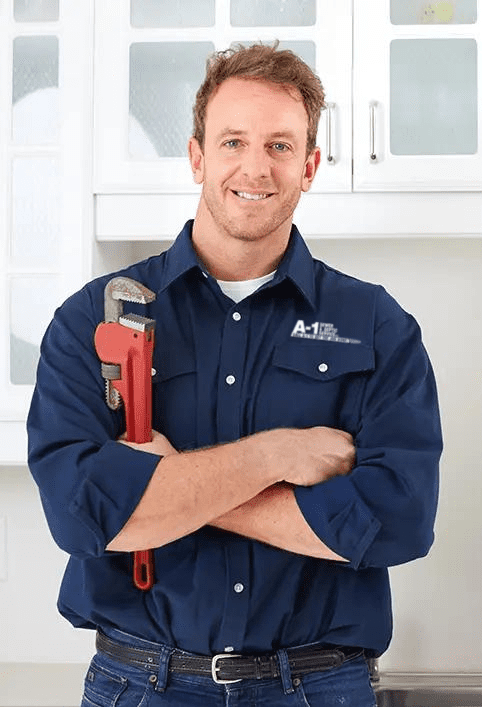If the Water is Staying in the Washing Machine
Does the water sit in the machine after your load has finished and the water level doesn’t go down, or do you have a slow water flow when draining? The issue probably lies with the washer. This problem could be traced to the drain tube (which comes out of the machine), the lid switch or the drain pump (an internal issue).
There are generally 2 types of washing machines: front load washer and top-loading washing machines. Both of these will attach to washing machine drain pipes, and both the top and front loader washing machines can be susceptible to kinks or a blockage in the drain hose, or a clog in the drain line.
Troubleshooting this is simple enough and with a little know how you can determine the cause of the problem. Use pliers to squeeze the spring fitting or a screwdriver to loosen the clamp, detach the drain tube from the washer drain and blow inside.
If nothing blocks the air from going through then the problem may be with the washing machine itself. Typically the problem is either a lid switch or the drain pump and not the washer’s drain water line.
What can you do if the drain pump is broken? You may need to call an appliance repair service for help, and most can work on major brands such as Samsung, Whirlpool, Maytag, and more. Check to see if there is a washing machine repair warranty you can utilize as well, as some of the repairs may be covered at no cost to you.
If Water is Overflowing From the Washer or at the Drain Standpipe
When you notice leaks after your washing machine drains, you are probably looking at a clogged drain. This clog could be anywhere in the trap area or beyond in the waterline. (If you follow the washing machine hose to the drain standpipe, past that pipe is the trap.)
Here is how you can find out where the drain clog is:
- Dump water into the washing machine
- Set the dial to spin or drain
- Watch the standpipe (from within reach of the dial)
- A time when the water starts backing up
- Turn off the washer once the leaking starts
If you noticed the water back up after only a few seconds, the clog is probably closer to the trap area. You might only need to insert a small drain snake at the standpipe to take care of the clog. If it took a while for the backup to develop, you may need a longer drain snake inserted at a cleanout to fix the clog.
How Long Do Washing Machines Last?
In the United States, almost every home has a washing machine, and the few people that don’t have them, certainly wish they did. Spending hours each week at the laundromat can be a large waste of time, so most people go out of their way to ensure that they have a washer and dryer.
Washers are fantastic household appliances and modern washing machines have computers that can provide error codes for troubleshooting or running different cycles and programs, often on the front panel, and give consumers great performance over many years. However, just like the garbage disposal, hot water heater, dishwasher, and refrigerator, washers don’t last forever. Eventually, washers need to be replaced, but when? What is the lifespan of a washing machine?
Average Lifespan of Washing Machines
On average, top and front-loading washing machines last about 14 years. The 14-year estimate is based on one load of laundry per day, or seven loads each week. Basically, washers are expected to handle about 5,100 cycles before they need to be replaced, so mathematically the average washer should handle a load per day for 14 years.
When you wash less than seven loads per week, then you’re automatically extending the lifespan of your washer, and if you wash more than seven loads per week, you’re shortening its lifespan. It all comes down to the size of your household and how much laundry you do.
However, if the washing machine is on the lower end, for example, it costs around $399, it may only be able to handle 4,000 loads. On the other hand, the higher-end models that cost around $1100.00 may be able to handle as many as 8,000 loads or more before they need to be replaced. In essence, you get what you pay for.
If you’re on the market for a new washing machine in Kansas City, KS, recommend checking the cycle rating before plopping down $400 to $1100.00. If you find a bargain where a washer is only a couple hundred dollars more but is rated to handle double the cycles, you should take advantage of it.
Stress on the Washer
One of the main reasons why washers break down is because too much stress is placed on them. When people overload washers, they place too much stress on the parts, such as the motor. The harder the washing machine parts must work to wash a single load, the shorter the machine’s lifespan.
You can spend $1,000 on an 8,000-cycle washer, but it can break down after just 1,000 loads of people (especially children) in your household are constantly overloading the washer. To extend the life of your washer, only wash smaller loads and if you need to wash larger items, such as comforters and sleeping bags, take them down to the local laundromat.
Call a Professional Plumber at A-1 Sewer and Septic
If your washer is leaking, it may be repairable. The leak may be a sign that a part, such as a hose needs to be replaced, but in some cases, you may need a professional plumber to help with your home’s drains! Contact A-1 Sewer & Septic Service Inc today!



